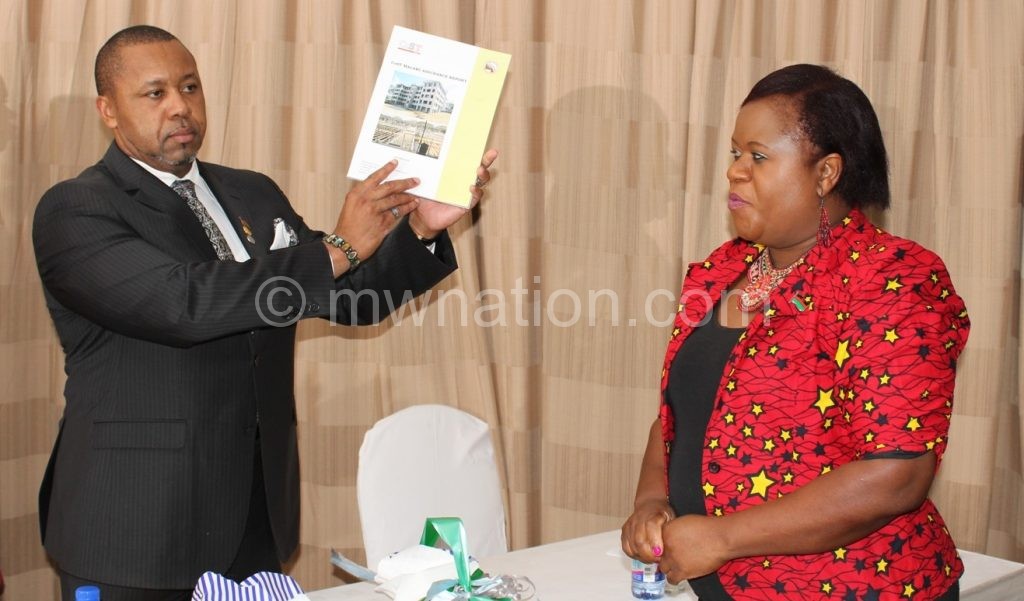Broke govt gives away billions
Picture this: the 50-kilometre Nsanje-Bangula Road was supposed to cost K7.4 billion, but ended up depriving the taxpayer around K9 billion or K2.4 billion more than it should have.
And the road was completed more than a year after deadline amid numerous extensions.

But this was not a one-off cost overrun.
The Nation’s month-long investigation—validated by the Construction Sector Transparency Initiative (CoST) Assurance Study for October 2016 launched yesterday—shows that the project management crisis in Malawi is broader, deeper and, as shown, expensively entrenched, as scores of projects are off track.
Apart from the indiscipline in the management of two of the most important project baselines—time and cost—the ingrained culture of allowances, poor forecasting and general incompetence in the public sector is costing Malawi dearly and exerting pressure on the country’s national budget that is fast approaching its elasticity limit.
The Nation has discovered that most of the projects hit by delays are those funded with loans from Arab funders who do not provide for allowances in project designs, which, according to a well-placed Treasury source, discourages officials from pushing for their timely implementation.
These financiers include Saudi Fund for Development, Arab Bank for Economic Development (Badea), Kuwait Fund and Opec Fund for International Development.
However, cost overruns are more prevalent in government funded projects, according to the CoST study, although they, too, experience delays.
For example, K95 million construction works at Dedza Secondary School whose duration was 18 months, but took 25 months and ended up costing K135.8 million.
Completion of construction works at Machinga Secondary School have been abandoned due to inadequate and delayed payments and there might be contests over final payments which, as of June 2016, had amounted to K486.7 million of the K699 million awarded contract amount.
On the K39 billion Old Airport-Kasiya-Santhe Road, CoST found that since commencement of the contract, Mota-Engil has not been paid and interests continue to mount which the government will have to service on top of the contract amount.
Due to fluctuations of material prices, cost overruns were also noted in the Chikungu and Malomo water supply projects of the Central Region Water Board.
In addition to these, government has failed to sustain completion or even commencement of several projects among them the Phalombe District Hospital eight years after borrowing $10 million (K7.3 billion) from Badea for the project and allocating hundreds of millions of kwacha in the budget each financial year for the past six years.
After 15 months of the process of identifying a contractor yielded no results because government flouted the loan agreement and funders did not give a ‘no objection’, the Ministry of Health has re-advertised the tender.
The hospital project had a budget of $22 million (K16 billion), with the Malawi government contributing at least $1.6 million (K1.1 billion), Badea $7 million (K5 billion) and Saudi Fund $14 million (K10 billion), to cater for the hospital complex itself, 60 staff houses and other associated external works, but there is not a single brick on site.
According to a report on Debt Sustainability for Malawi of the Centre for Social Concern (CfSC), about $47 million (K34 billion) has been spent on the Zomba-Jali-Phalombe-Chitakale road.
Between 2004 and 2006, government borrowed $22 million from Badea, OFID and Kuwait Fund then a further $9.9 million (K7.2 billion) as supplementary loans for the same project in 2011 before borrowing an additional K3.4 billion in 2013/2014 after adding Kamwendo to the road project.
But 12 years after several loans were procured by government, there is little hope of it being completed.
According to the report, government sourced funding from Badea, OFID and Saudi Fund amounting to $29 million for the construction of three Teacher Training Colleges (TTCs) in Chikwawa, Mchinji and Rumphi, but eight years have lapsed and a contractor is yet to be identified.
The delay to construct the three TTCs means there is little action to reduce the huge shortage of teachers which an increased intake of 540 students per TTC would have helped had the project been implemented on time.
The laxity by government begs the question of whether opportunity costs are taken into account when entering into the loan agreements as the government spends years failing to implement a project whose funding could have gone to other needy sectors.
Delayed project implementation seems more prevalent in the Ministry of Health projects as evidenced by the delay in construction of Nkhata Bay District Hospital whose loan was secured in 2007, but works only started five years later in 2012.
The CoST assurance report consultant Rodney Kumsinda concluded that projects more likely to suffer non-payment, overruns or delayed payment were locally funded.
CfSC on the other hand faulted the loan contraction process in government, which excludes other stakeholders such as civil society who would be best placed to critique the project and make appropriate recommendations.
While admitting the government’s laxity in executing projects, including donor funded ones, the Ministry of Finance has said the cost to the taxpayer is lower when such projects are funded by financiers such as Badea, OFID and Kuwait Fund as these are without conditions and repayment terms are generous with 10 year grace period.
For example, Badea loans usually have a repayment period of up to 50 years with a one percent cost of loan.
Ministry of Finance spokesperson Nations Msowoya conceded that the technical capacity in the ministries implementing the project was also a challenge because for Arab funded projects, they rely on the office of director of buildings to conduct designs and other related works when it is also overwhelmed.





